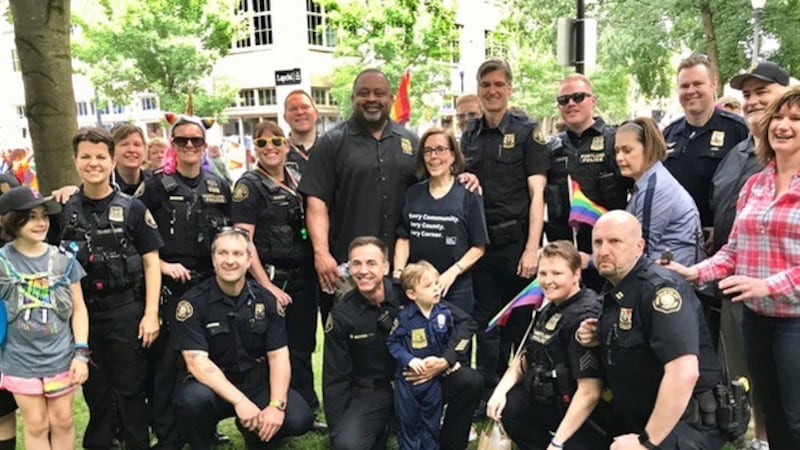Policing the Pride parade in Portland has been a thorny endeavor in recent years.
There is a long, dark history of police—both in Portland and nationwide—harassing and abusing LGBTQ bars and clubs. Most Pride parades occur in June, near the anniversary of the 1969 Stonewall riots, which broke out after police raided a popular gay bar in New York City.
Two years ago, Pride Northwest organizers asked officers to leave their uniforms at home, saying the presence of uniformed police might discourage LGBTQ people of color from marching. This year, the Portland Democratic Socialists of America asked the parade organizers to cut ties with Portland police and corporate sponsors to honor the roots of Pride.
"The first Pride was a protest led by Trans Women of Color against the police," the DSA said in a statement. "The goal of the protest was not mere integration into straight society, but radically rethinking how society constructs norms and forces us to conform."
But many LGBTQ officers feel a strong tie to the parade and marching in their uniforms.
WW spoke to Robert Ball, the longtime former reserve commander who has been marching in the Portland Pride Parade for 23 years, about the relationship between police and the LGBTQ community.
WW: What was your first Pride parade like?
Bob Ball: I remember being terrified. Looking back, the Police Bureau is a big patriarchal organization that's semi-military. At that time, you would still hear comments that were derogatory toward gays and lesbians in different corners of the bureau. It happened to me many times. I remember seeing a motorcycle officer giving me a really bad look—a cold stare. I can still remember it to this day. There was a worry that you wouldn't be accepted in the bureau if you did something like this.
When I got there, Vera Katz was the mayor at the time, and she was surprised I was there. She looked at me and she said, "Honey, you look scared to death." She literally held my hand when we were marching.
How did you feel about Pride Northwest asking not to march in your capacity as a police officer? How do you feel about activists asking the parade to cut ties with PPB?
I really felt like the request for officers to not march was essentially trying to put them back into the closet. Banning police officers from a Pride parade—I think makes it go back in the other direction and actually hurts trust. I believe they are not recognizing the hard work and change that's occurred [in the bureau]. It's a two-way street. If people work hard to make changes, I think that needs to be recognized and it needs to be celebrated.
Why is it important to you to march in your uniform?
The Police Bureau openly welcomes trans officers, openly welcomes gay and lesbian and bi officers. It's a whole different world now, and it's because gay and lesbian officers were out being seen and got acceptance from the Police Bureau. The U.S. Department of Justice says that the No. 1 thing that police departments can do to build trust is to have departments look like the communities they serve. I think it's really important for African American officers, Hispanic officers, Asian officers, women officers and LGBTQ officers be seen, so that people out in the community can see that there's someone who is like me [in the bureau].
What about the real concerns from people who point to the history of police treating LGBTQ people poorly and harassing bars and clubs that were incredibly important to those communities?
I understand the history of it. It's horrible to even think about it. But it happened. It's a real history. But that history is not the world we live in now. I can't put myself in the place of an African American LGBTQ person who is afraid of the police. [But] I can put myself in the place of being fearful because I've been through that. I grew up in rural Oregon as a gay kid who heard slurs and was afraid to come out. I went into the Police Bureau, and I felt afraid. [But] sometimes you have to feel discomfort to have progress.
What do you think can be done to respect concerns about the dark history of the relationship between the LGBTQ community and police, without sidelining officers who want to celebrate their own identities?
I would challenge them to get to know people. I really understand that people may be fearful. And I think our past is always important to remember, because history can tend to repeat itself. The only way we can stop that from happening is to continue to work hard. The more people in communities get to know LGBTQ officers as people, a lot of that fear would dissipate. They would be able to learn and understand what their jobs are and how things have changed dramatically over the years—because they really have.

How a Classified Ad in an Underground Newspaper Ignited Portland's LGBTQ Rights Movement
Eight Portland LGBTQ Nonprofits
